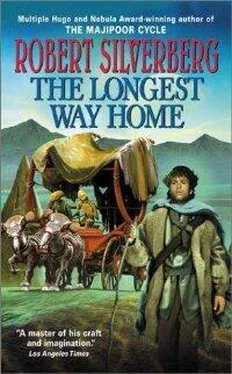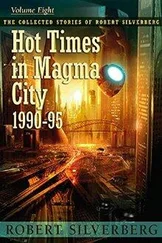Joseph understood why a truly dynamic, ambitious race would object to being conquered that way. He could not imagine the Masters, say, ever accepting the rule of invaders from space: they would fight on and on until all Homeworld was stained with blood, as it was said had happened in the time of the empires of Old Earth. But the Folk were in no way dynamic or ambitious. Before the Masters came, they had been slipping back into an almost prehistoric kind of life here. Under the rule of the Masters they were far more prosperous than they could ever have become on their own. And it was not as though they were slaves, after all. They had full rights and privileges. No one forced them to do anything. It was to their great benefit, as well as the Masters’, for them to perform the tasks that were allotted them in the farms and factories. Master and Folk worked together for the common good: Joseph had heard his father say that a thousand times. He believed it. Every Master did. So far as Joseph knew, the Folk believed it too.
Because the system had always seemed to work so well, Joseph had never had any reason to look upon his own people as oppressors, or on the Folk as victims of aggression. Now, though, the system was not working at all. Joseph wished he could discuss the recent events in Manza with Balbus. Were the rebels mere brutal killers, or could there be some substance to their resentments? Joseph could see no justification, ever, for killing and burning, but from the rebels’ point of view those things might well have seemed necessary. He did not know. He had lived too sheltered a life; he had never had occasion to question any of its basic assumptions. But now, suddenly, everything was called into question. Everything . He was too young and inexperienced to wrestle with these problems on his own. He needed someone older, someone with more perspective, with whom to discuss them. Someone like Balbus, yes. But Balbus was gone.
Unexpectedly Joseph found himself drifting, a few days later, into a series of conversations with the Ardardin that reminded him of his discussions with his late tutor. The Ardardin had taken to visiting him often in the afternoons. Now that Joseph had taken up residence in the village once more, his services as a healer were needed again, and the Ardardin would come to him and conduct him to the village infirmary, where some villager with a running sore, or a throbbing pain in his head, or a mysterious swelling on his thigh would be waiting for Joseph to cure him.
Joseph did not even try to struggle against his unwanted role as a healer now. It no longer embarrassed him to be engaging in such pretense. If that was the role they wanted him to play, why, he would play it as well as he could, and do it with a straight face. For one thing, his ministrations often seemed to bring about cures, even though he had only the most rudimentary of medical technique and no real notion of how to cope with most of the ailments that were presented to him. These Indigenes appeared to be a suggestible people. They had such faith in his skills that a mere laying on of hands, a mere murmuring of words, frequently did the job. He became accustomed to seeing such inexplicable things happen. That did not instill in him any belief in his own magical powers, only an awareness that faith could sometimes work miracles regardless of the cynicism of the miracle-worker. And his magical cures justified his presence among them in his own eyes. He was eating these people’s food and taking up space in their village as he hobbled around waiting for his leg to heal. The least he could do for them was to give them succor for their ills, so long as they felt that such succor was within his power to give. What he had to watch out for was beginning to believe in the reality of his own powers.
Another thing that troubled him occasionally was the possibility that his medical services were becoming of such value to the villagers that they would keep him among them even after he was strong enough to get on his way. They had no reason to care whether he ever returned to his home or not, and every reason to want to maintain him in their midst forever.
That was not a problem he needed to deal with now. Meanwhile he was making himself of use here; he was performing a worthwhile function, and that was no trivial thing. The whole purpose of this trip to the northern continent had been to prepare him for the tasks that someday would be his as Master of House Keilloran, and, though his father certainly had not ever imagined that ministering to the medical needs of a village of Indigenes would be part of that preparation, it was clear enough to Joseph that that was something entirely appropriate for a Master-in-the-making to undertake. He would not shirk his responsibilities here. Especially not for such an unworthy reason. The Indigenes would let him go, he was sure, when the time came.
The more doctoring he did, the more adventuresome he became about the things he would try that could be regarded by him as genuine medicine, and not just mere faith-healing. Joseph did not feel ready to perform any kind of major surgery, and did not ever think he would be; but, using the few simple tools he found in his utility case, he started stitching up minor wounds, now, and lancing infections, and pulling decayed teeth. One thing he feared was that they would ask him to deliver a child, a task for which he lacked even the most basic knowledge. But they never did. Whatever process it was by which these people brought their young in the world continued to be a mystery to him.
He began to learn something about Indigene herbal medicine, also, and used it to supplement the kind of work he was already doing. It puzzled him that the Indigenes should have developed the use of such a wide range of drugs and potions without also having managed to invent even the simplest of mechanical medical techniques. They could not do surgery, they could not suture a wound, they could not set a fracture. But they had succeeded in finding natural medicines capable of reducing fever, of easing pain, of unblocking a jammed digestive tract, and much more of that sort. Their ignorance of the mechanical side of medicine, amounting almost to indifference, was one more example, Joseph thought, of their alien nature. They are simply not like us. Not just their bodies are different, but their minds.
His instructor in the use of Indigene herbs was a certain Thiyu, the village’s master in this art. Joseph never found out whether Thiyu was male or female, but it was certain, at least, that Thiyu was old . You could see that in the faded tone of Thiyu’s bronze skin, from which all the orange highlights had disappeared, and from the slack, puffy look of Thiyu’s throat-pouch, which seemed to have lost the capacity to inflate. And Thiyu’s voice was thin and frayed, like a delicate cord just at the verge of snapping in two.
In Thiyu’s hut behind the infirmary were a hundred different identical-looking ceramic jars, all of them unmarked, each containing a different powder or juice that Thiyu had extracted from some native plant. How the Indigene knew what drug was contained in which jar was something Joseph never understood. He would describe to Thiyu the case he was currently working on, and Thiyu would go to the collection of jars and locate an appropriate medicine for him, and that was that.
Aware that knowledge of these drugs was valuable, Joseph made a point of asking Thiyu the name of each one used, and its properties, and a description of the plant from which it was derived. He carefully wrote all these things down. Bringing this information to his fellow Masters, if ever he returned to his own people again, would be part of the service that a Master must render to the world. Had any Master ever bothered, he wondered, to study Indigene medicine before?
Читать дальше












